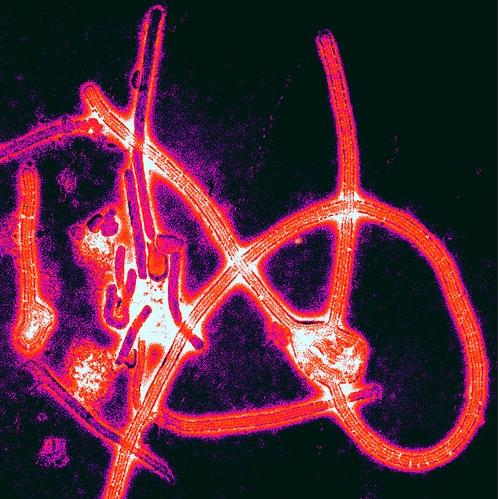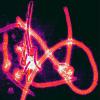Though Ebola activity has slowed in all three of the most affected countries, the trickle of new infections continues, with 70 more cases reported, according to the latest update from the World Health Organization (WHO).
The new illnesses lift the overall total in the three countries to 21,759 cases. In addition, 42 deaths have been reported since the WHO's full epidemiologic report yesterday, boosting the fatality count in Guinea, Liberia, and Sierra Leone to 8,668.
Among the latest cases are new reports from Guinea and Sierra Leone as of Jan 19 and Liberia as of Jan 20. The WHO has said numbers are subject to change, due to ongoing reclassification and investigation findings. However, compared with the WHO update yesterday that included cases for all three countries to Jan 18, the newest cases include 46 in Liberia, 22 in Sierra Leone, and 2 in Guinea.
Sierra Leone is still the worst-hit country, with 10,362 Ebola infections. However, Liberia—with 3,636 fatalities—has the most deaths.
Response updates
In a separate report, the WHO said today that two emergency campaigns have distributed antimalarial drugs to 2.5 million people in Sierra Leone. Malaria is a common cause of febrile disease in the outbreak region, but during the outbreak, people sick with the mosquito-borne illness have been afraid to go to hospitals and clinics for fear of contracting Ebola or haven't been able to seek treatment, because the Ebola outbreak has shuttered health facilities.
The WHO said distributing the malaria drugs is an important response step, designed to keep people with fevers due to malaria out of Ebola treatment facilities, where they would be at risk of contracting Ebola.
During the campaigns, 8,330 health workers were recruited to distribute the drugs in eight districts: Bombali, Kambia, Koinadugu, Moyamba, Port Loko, Tonkolili, Western Urban, and Western Rural. Sierra Leone's health ministry implemented the program with technical support from the WHO in collaboration with Doctors without Borders (MSF), the United Nations Children's Fund (UNICEF), and other Roll Back Malaria partners.
Pedro Alonso, MD, PhD, with the WHO's global malaria program, said in the statement that his team has completed a preliminary assessment of the campaigns and will finish a more detailed analysis of the program's impact in the next few weeks. He said officials believe the drug distribution has a profound impact on malaria transmission and the number of suspected cases sent to Ebola evaluation centers.
"The community responded very positively—so positively that numbers of people wishing to receive the anti-malarial medicines were higher than expected," Alonso said.
In Liberia, a group from the United Nations Mission for Ebola Emergency Response (UNMEER) and partners from the WHO, the US Centers for Disease Control and Prevention (CDC), the International Medical Corps, and local health officials have been discussing steps for implementing phase 2 of the Ebola response in Bong County, according to an update today from UNMEER. The organization fleshed out steps that include setting up waste management procedures for communities and health facilities, establishing volunteer watch groups, forming teams to enhance community support, and coming up with a strategy to launch the next phase.
The next phase of the response, expected to launch in late January, will focus on active case finding, surveillance, and social mobilization and support activities, UNMEER said.
Other developments
- Nebraska Medical Center said today that an American health worker who was admitted to its biocontainment unit on Jan 4 after a high-risk exposure to Ebola in Sierra Leone did not develop the disease and has been discharged, the facility said on its Twitter feed. The unnamed patient relayed a message asking for privacy, praising the care team, and expressing a desire to return to working in West Africa after spending time with family.
- Health workers caring for mothers and their breast-fed babies in Ebola outbreak settings should consider testing breast milk and urine for the virus, in addition to blood, a team of Belgian, German, and West African researchers reported today in Eurosurveillance. They based their findings on two mother-baby pairs that were treated at an MSF Ebola treatment center in Gueckedou, Guinea. In one case, the blood of a mother recovering from Ebola infection tested negative twice, but tests showed the virus was present in her urine. The woman's baby got sick with Ebola and died. In the second case, the mother's blood was positive for the virus, but the breastfed baby remained free of the disease. The team wrote that polymerase chain reaction testing in urine and breast milk may be useful for such patients, alongside counseling about hygiene when virus is found in the fluids.
See also:
Jan 22 WHO update
Jan 22 UNMEER report
Nebraska Medical Center Twitter feed
Jan 22 Eurosurveillance report


















